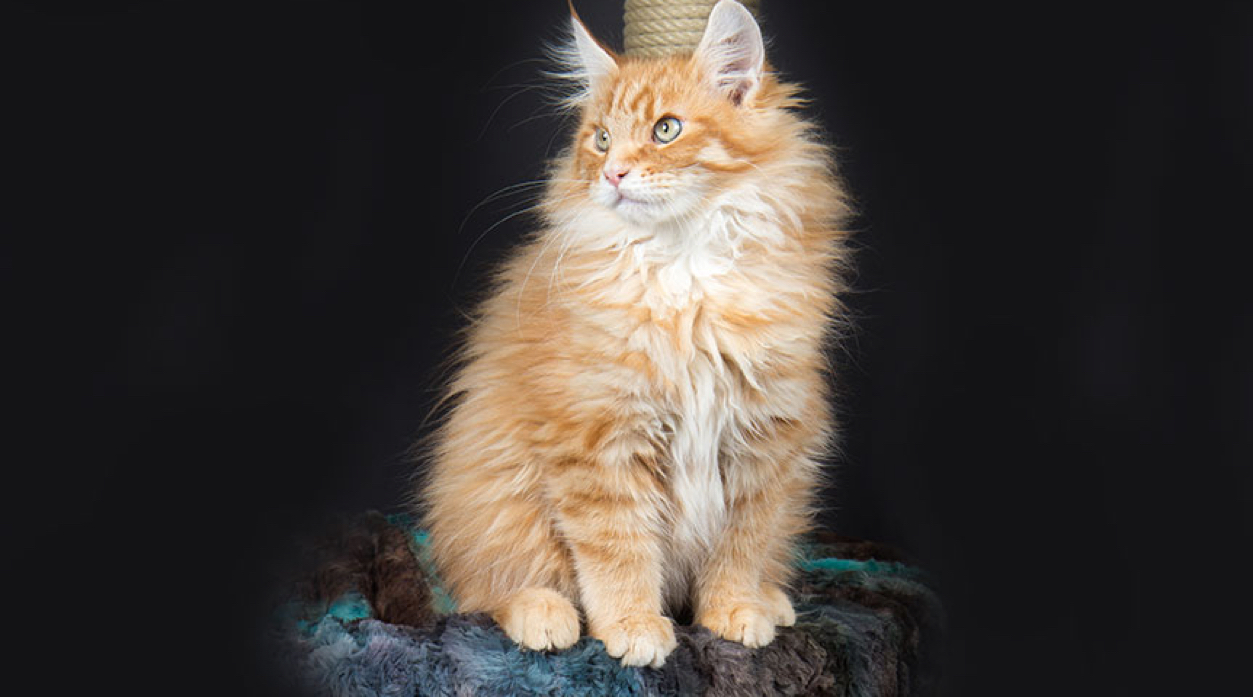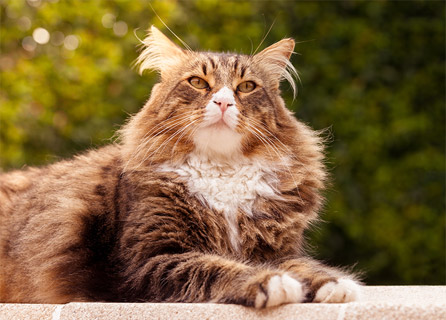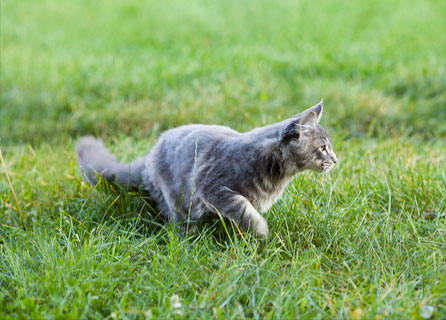
Maine Coon breed guide
The Maine Coon is polite, obedient and loving and makes a perfect family pet. Discover more about this gentle giant, and get tips on a range of topics from exercise, grooming and behaviour, to what you can do to keep your cat healthy and happy.
Breed information and advice
The Maine Coon is laid-back, affectionate and loves to be with their feline or human family. While they don't make the best lap cat - as they're just too big - they'll enjoy lying close to you and are great with children. Here's more you should know:
- Smart but silly, this breed is fun, playful and can learn tricks.Smart but silly, this breed is fun, playful and can learn tricks.
- The Maine Coon has a long, shaggy coat that will need to be brushed weekly.The Maine Coon has a long, shaggy coat that will need to be brushed weekly.
- Typically they'll weigh between 4kg and 8kg, when fully grown.Typically they'll weigh between 4kg and 8kg, when fully grown.
- A healthy Maine Coon will usually live for 12 to 15 years.A healthy Maine Coon will usually live for 12 to 15 years.
Typical size of a Maine Coon: Large

Recommended exercise and nutrition
As one of the largest domesticated cat breeds, you will need to put your Maine Coon through their paces if you're to keep them both mentally and physically stimulated. They need lots of space to roam and will enjoy the outdoors, so letting them out in the garden or backyard - on a harness or leash, if you wish - means they can stretch out their legs.
An indoor climbing tree is a fun stimulus, while your cat or kitten is smart enough to learn a few simple tricks such as how to fetch or open a door. However you play with them, time spent together will engage and interest them, and help to strengthen your bond.
Cats are strict carnivores, and your Maine Coon will need a meat-based diet, introduced to them as a kitten. Split the daily feed across two meals. Read the back of the packet for portion sizes, which will depend on their age, size and lifestyle.
People-friendly and a puzzle solver
Your Maine Coon likes human company and will exercise their mind with simple puzzle toys.

Common health problems and illnesses
Maine Coons need all of the usual vaccinations, flea and worming control, and dental checks to go on to lead a healthy life, but it’s worth being aware of some of the more specific ailments that can affect this breed, so you can look out for any symptoms.
Cardiomyopathy relates to any disease that affects a cat’s heart muscle, and can affect this breed. Hypertrophic cardiomyopathy is one of the more common of these heart conditions and causes thickening of the heart’s muscles, making it more difficult for the organ to relax between contractions. Keep an eye out for any signs in your cat such as loss of appetite, weakness or difficulty breathing. Speak to your vet, who will be able to do a full examination and advise on treatment options, if you have any concerns.
Maine Coons are prone to hip dysplasia, an abnormal development of the hip joint which can lead to arthritis. Maine Coons who suffer from a severe form of this condition may become lame by six months of age. This is a degenerative disease, meaning that it worsens over time. Your vet will be able to do a physical exam if you have any concerns.
Stomatitis affects cats of any age or sex, but it seems to be more common in Maine Coon cats. When gingivitis and periodontitis become widespread in your cat’s mouth, they can develop into stomatitis. Stomatitis is caused by the advanced immune response to gingivitis and periodontitis that comes with even more extreme swelling and pain and even lesions on gums. In addition to scaling teeth, stomatitis treatment involves antibiotic or corticosteroid medications as well as extracting certain teeth that are severely affected by the swelling. In very extreme cases, your vet may suggest whole mouth extractions. The best solution is prevention. Starting a brushing routing is necessary even if your cat has healthy teeth and gums.
This is a spinal disorder which causes the loss of spinal cord nerves that control muscles in the limbs. This leads to muscle weakness and clinical signs become apparent by 3-4 months of age. There is no complete cure and treatment involves managing the symptoms and preventing complications. Please speak to your vet.
Find out about insurance for your Maine Coon
Learn how pet insurance works and what kind of cover you might need for your cat.
Grooming advice
Your big cat’s long, flowing fur does not get matted easily as it is also silky - but you will need to groom them to remove dead skin and loose hair. Twice-weekly brushing with a stainless steel comb should do the trick, while a grooming rake will help remove dead skin from their undercoat.
Because they’re fans of water, the task of washing your pet is made a little easier. Bathe them any time they need it, from every couple of weeks to every few months. If their fur feels greasy, smells or looks stringy, a wash is needed.
Keep their nails trimmed back by cutting them every few weeks, and use a damp cloth to wipe round their ears every day or so. To stave off any potential dental problems, cleaning your cat's teeth daily is recommended to help keep their mouth clear of bacteria, plaque and tartar.
Fun and interesting facts
- The sturdy Maine Coon was originally found on farms and ships and used for their ability to catch mice.The sturdy Maine Coon was originally found on farms and ships and used for their ability to catch mice.
- Cosey the Maine Coon was the winner of the first ever American Cat Show, held way back in 1895.Cosey the Maine Coon was the winner of the first ever American Cat Show, held way back in 1895.
- The breed has water-resistant fur, making them a great swimmer.The breed has water-resistant fur, making them a great swimmer.
- They'll chirp or trill, rather than meowing.They'll chirp or trill, rather than meowing.
- Renowned for their size, they're the biggest of all domestic cat breeds.Renowned for their size, they're the biggest of all domestic cat breeds.
Important information
The content on this page aims to offer an informative introduction to pet breeds, but does not constitute expert veterinary advice. If your dog or cat falls ill or has an injury, contact your vet immediately.
All facts and figures were correct at date of publication and were compiled using a range of sources.
Discover more breeds
Browse our other cat and dog guides to learn about some of the UK’s most popular breeds.